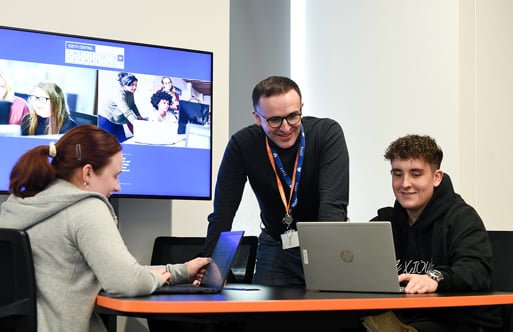VeriSM is a service management approach that is specifically tailored to helping organisations succeed in the world of digital services, aiding them in the development of their service management principles and digital transformation.
VeriSM is owned by the International Foundation for Digital Competency (IFDC). BCS is one of the stakeholders and a board member of IFDC. BCS has been involved in the project since its inception and continues to play an active role in VeriSM’s onward development and progress.
We caught up with Johann Botha, CEO of getITright and a lead author of VeriSM to talk about his motivations, his career and how you can help your business transform digitally though deploying VeriSM’s ideas.
Why don’t you introduce yourself and tell us a little about your work.
If you don’t count playing around on a ZX80 at school, my life in some way or another has had something to do with IT for thirty-six years. The last twenty, in some shape or form, revolved around IT management practices and helping mostly IT people to make a difference to their customers and their businesses.
What role have you played in VeriSM’s development?
I became involved in VeriSM halfway through the development of the first book that defined the VeriSM approach. My contribution was making suggestions and some critique, but I found the body of work fascinating and it resonated so much with what I was working on at the time.
When it came to the second book, which was to be about practice and application, I was asked to join the lead author team. I hope it was because of my contribution to the first book and because I have lots of practical experience in quite diverse functional and geographical environments.
With the new book, which we are busy writing at the moment - it’s called VeriSM Unwrapped and Applied, by the way - my area of focus is on the strategic and leadership part of the work. I believe governance and strategy are important if you want to survive in a digital age.
I say, in the book, that an organisation without good (but flexible) strategy, governance and management will not survive the digital age - the business environment is too complex, with too many variables - no-one can get that lucky!
It’s also interesting to write for a broader audience - not just IT people. You regularly have to ask yourself ‘will a HR or finance person get what we are writing about?’
Looking at VeriSM’s recent evolution, what has impressed you most, and what are you looking forward to?
We have an impressive team of contributing authors that support us with advice, ideas, guidance and content; at last count over 70 people are currently involved in some shape or form! What impresses me most is the level of enthusiasm with which people from all over the world embrace the ideas, and their willingness and eagerness to put the ideas into practice!
There are quite a few early adopters who are really pioneers with VeriSM; you will read quite a lot about them in the new book, it will be chock-full of practical examples and cases of how, either some of the concepts we have written about, or the entire approach, was applied and tailored for a specific organisation or context.
How has the VeriSM community moved the project forward recently and how does the community ensure constant evolution?
VeriSM embraces many of the fundamental precepts used in evolutionary methods like lean and agile, although you don’t have to adopt the methods of these approaches in VeriSM. I think you would be missing the point if you don’t look at the cultural aspects of these emerging practices.
The IFDC owns the intellectual property of VeriSM, and it has managed to get quite substantial community involvement. I would encourage all your readers to have a look at IFDC.global and find some way to become involved. There are really lots of opportunities to do just that.
What can you tell us about organisations who are using VeriSM now? What have their experiences taught you about VeriSM?
The first VeriSM book was only published in December 2017, so anyone who claims to have a long track record with VeriSM is being creative with the truth. That being said, the principles and practices in VeriSM are tried and tested and individually there are tons of examples of where and how it worked and lots of evidence of the associated benefits.
We hope to have lots of these examples in the new book, and we are currently busy sourcing and compiling these cases and success stories. There are a few early adopters for the concepts, in the broadest possible sense, and these range from banking to publication to retail.
What advice would you give to somebody thinking about embracing VeriSM?
Firstly, there is help available. If you need someone to help, contact the IFDC. They will put you in contact with someone in the author team - remember more than 70 people are involved with really diverse backgrounds, skills and competencies!
Secondly, VeriSM requires a shift in thinking and will impact on the way you do things in the entire organisation. If it doesn’t bring change to your entire organisation, then you are doing it wrong! So that means that leadership is essential and executive participation (note, I did not say support or commitment) are two essential ingredients if you want to make this work!
Thirdly, remember this is not prescriptive and VeriSM is definitely not a recipe. It’s guidance and advice, and it’s best to mix in a healthy amount of your understanding of your unique setting and context, and also common sense.
Finally, this will require long-term vision and will impact on organisational culture. It’s for that reason that there will be a whole chapter in the new book on OCM, not just regurgitating academic theory - real practical guidance on making change successful and making change stick!
What’s the best way to prepare your organisation and your team for VeriSM?
It will be helpful if the team understands at least the basic concepts of VeriSM, but you really can’t train people to change. The best way I would think that you can prepare your team is to lead by example, and support them when the going gets tough. A lot of people are talking about servant leadership (a leadership philosophy that turns the traditional top-down management structure on its head and sees the leader serving the people) - We don’t just talk about servant leadership, it’s an essential ingredient for success! Training is part of general awareness, but we also plan programmes that will help practitioners and leaders to apply the concepts in VeriSM.
What makes VeriSM relevant to professionals outside of service management?
We live in a service-driven world, even the most basic products these days have a service component. So are there people outside service management? Remember, we say that it’s a shift in thinking - everyone is a service professional and has to think about service management!
What’s next for VeriSM and its evolution?
The very next thing is the release of VeriSM Unwrapped and Applied. Based on the book, two qualifications will also be made available, and we are not going to do it the same as everyone else. There will be a practitioner level qualification that will focus on practical application, not just theory, and then a qualification for the executives and leaders in organisations who would like to use VeriSM to map their digital age journey.
The leadership / executive programme will NOT be training but most probably workshop-based skills transfer and application and, as a result, this programme will need to be facilitated by very senior and experienced facilitators and coaches. The details are not yet finalised, but we will be breaking the mould - yet again!

















